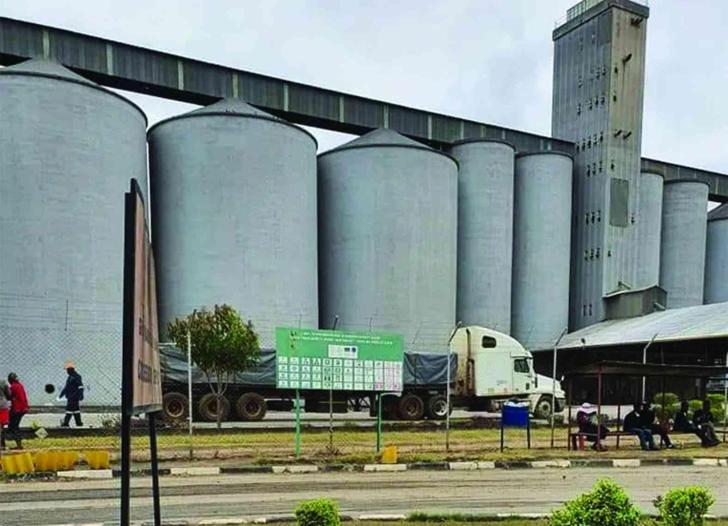News / National
Presidential inputs recipients ordered to deliver grain to GMB
30 Jun 2025 at 12:09hrs |
0 Views

Farmers who received free agricultural inputs under the Presidential Inputs Scheme during the 2023–2024 farming season are now required to deliver 10 kilograms of grain each to the Grain Marketing Board (GMB), in a government directive aimed at strengthening Zimbabwe’s Strategic Grain Reserves (SGRs).
The new requirement was announced at a recent Zanu PF Masvingo Provincial Coordinating Committee meeting, where Minister of State for Provincial Affairs and Devolution Ezra Chadzamira said the initiative is intended to assist vulnerable communities in the future.
"Every beneficiary is expected to deliver 10kg of grain, be it maize or wheat, and have their names recorded," Chadzamira said. "In the event of a drought, those who would have given back to the government will be prioritised because they would have contributed to the national grain silos."
The directive has been confirmed by the Ministry of Lands, Agriculture, Fisheries, Water and Rural Development, with Permanent Secretary Professor Obert Jiri describing the delivery as both a "mandatory contribution" and "a gesture of appreciation to President Emmerson Mnangagwa."
"After vulnerable farmers were assisted through the Presidential Inputs Scheme during the El Niño-induced drought, they now need to give back by delivering 10kg of grain," said Prof Jiri. "This will help replenish the Strategic Grain Reserve and show appreciation to His Excellency."
The policy affects all recipients of Pfumvudza/Intwasa inputs - a flagship conservation agriculture programme championed by the government to improve food security in drought-prone areas.
Meanwhile, Permanent Secretary for Provincial Affairs and Devolution Dr Addmore Pazvakavambwa recently noted that Masvingo Province had recorded a grain surplus for the 2024/2025 season, with only Chivi District expected to require food aid after about 10 months.
Despite these gains, Zimbabwe’s SGRs currently hold approximately 500,000 tonnes - far below the 1.5 million tonnes target the government aims to achieve by 2028 to mitigate climate change-related shocks and recurring droughts.
The new grain contribution requirement is expected to bolster reserves as authorities prepare for future climate uncertainties, though some farmers and civil society groups have questioned the mandatory nature of the policy and called for broader consultation.
The new requirement was announced at a recent Zanu PF Masvingo Provincial Coordinating Committee meeting, where Minister of State for Provincial Affairs and Devolution Ezra Chadzamira said the initiative is intended to assist vulnerable communities in the future.
"Every beneficiary is expected to deliver 10kg of grain, be it maize or wheat, and have their names recorded," Chadzamira said. "In the event of a drought, those who would have given back to the government will be prioritised because they would have contributed to the national grain silos."
The directive has been confirmed by the Ministry of Lands, Agriculture, Fisheries, Water and Rural Development, with Permanent Secretary Professor Obert Jiri describing the delivery as both a "mandatory contribution" and "a gesture of appreciation to President Emmerson Mnangagwa."
"After vulnerable farmers were assisted through the Presidential Inputs Scheme during the El Niño-induced drought, they now need to give back by delivering 10kg of grain," said Prof Jiri. "This will help replenish the Strategic Grain Reserve and show appreciation to His Excellency."
The policy affects all recipients of Pfumvudza/Intwasa inputs - a flagship conservation agriculture programme championed by the government to improve food security in drought-prone areas.
Meanwhile, Permanent Secretary for Provincial Affairs and Devolution Dr Addmore Pazvakavambwa recently noted that Masvingo Province had recorded a grain surplus for the 2024/2025 season, with only Chivi District expected to require food aid after about 10 months.
Despite these gains, Zimbabwe’s SGRs currently hold approximately 500,000 tonnes - far below the 1.5 million tonnes target the government aims to achieve by 2028 to mitigate climate change-related shocks and recurring droughts.
The new grain contribution requirement is expected to bolster reserves as authorities prepare for future climate uncertainties, though some farmers and civil society groups have questioned the mandatory nature of the policy and called for broader consultation.
Source - Tellzim
Join the discussion
Loading comments…
































